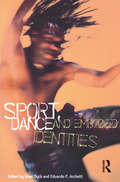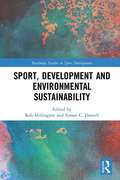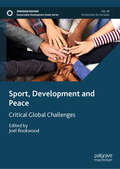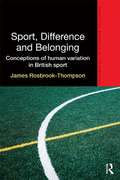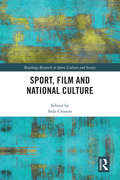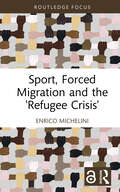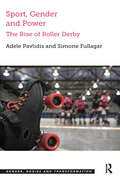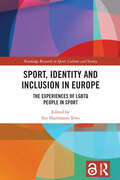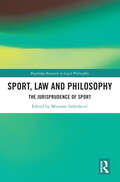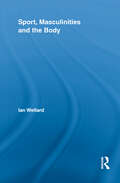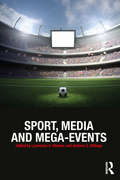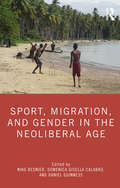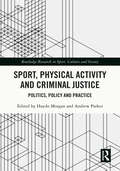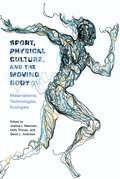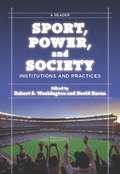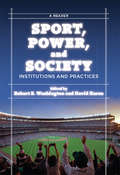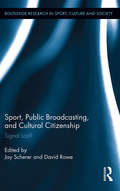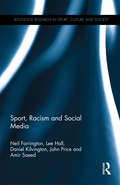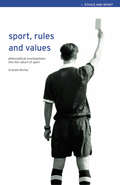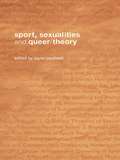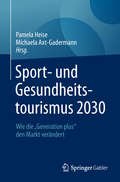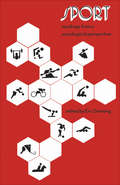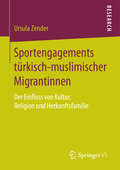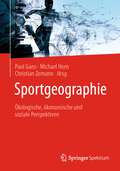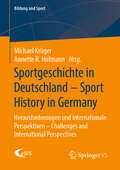- Table View
- List View
Sport, Dance and Embodied Identities
by Noel DyckSport and dance command the passions and devotion of countless athletes, dancers and fans worldwide. Although conventionally thought to reside within separate social realms, these two embodied cultural forms are revealed in this benchmark volume to share a vital capacity to constitute and express identities through their practiced movements and scripted forms. Thus, the work of choreographers and coaches along with the performances of dancers and athletes offer not merely entertainment and aesthetic accomplishment but also powerful means for celebrating existing social arrangements and cultural ideals or, alternately, for imagining and advocating new ones.Drawing on a wide selection of sport and dance activities from around the world, this book elucidates the ways in which embodied performances both mirror and reshape social life. It traces, for example, how football, salsa and tango can each be employed to articulate or rewrite national and gender identities. Also examined are children's sport and the dynamics by which immigration and cultural integration, along with the socialization of children and youth, may be directed through the organization of community sport. The volume investigates the marshalling of sport and dance in settings from Africa to Ireland as vehicles for framing moral issues that revolve around the appropriate use, protection and exhibition of the body. This innovative study establishes the paradoxical fashion in which dance and sport can unite certain people and communities while at the same time serving exclusionary and nationalistic purposes.
Sport, Development and Environmental Sustainability (Routledge Studies in Sport Development)
by Simon C. Darnell Rob MillingtonThis is the first book to consider the intersections of sport, international development and environmental sustainability. It explores the tensions between sport’s potential contribution to the environment and its rather poor record to date. Bringing together a diverse group of scholars who approach the topic from various disciplinary and theoretical perspectives, the book provides both critical and optimistic perspectives on the place of sport in sustainable development. Chapters examine and question how and whether sport contributes to sustainable development on an international scale. Attention is also paid to the place and role of Indigenous knowledge in sustainable Sport for Development, particularly as an alternative to modernization and/or in support of reconciliation with Indigenous peoples. Sport, Development and Environmental Sustainability is important reading for academic researchers, students and policy-makers in the fields of kinesiology, sport studies, sport sociology, leisure studies, sport management, sport media, physical cultural studies, environmental studies and sustainability and international development studies.
Sport, Development and Peace: Critical Global Challenges (Sustainable Development Goals Series)
by Joel RookwoodThis volume offers a comprehensive exploration of the rapidly evolving landscape of Sport for Development and Peace (SDP), a critical approach to peacebuilding, economic development, and social transformation gaining increasing stature during the last twenty-five years. Contributors here scrutinize the diversification in SDP methods and ideals, spotlighting global dimensions and differences in this burgeoning field. Encompassing contributions from scholars across five continents, the chapters illuminate diverse approaches and analyses, reflecting a variety of viewpoints and experiences. The volume highlights the heterogeneity within SDP and assesses the trajectory of SDP studies, while also identifying common threads among seemingly disparate approaches. Further, it investigates sport's role in responding to global challenges, from financial crises to the COVID-19 pandemic, climate change, and conflicts, and although sport is often recognized for its potential to foster peace and development, this book navigates the intricate complexities and contradictions that can arise in the practice of harnessing sport for these goals. With 14 engaging chapters, the book delves into a range of topics, including critical analyses of different SDP approaches, the sustainability of sport initiatives, alignment of SDP with sustainable development goals, and the use of sport in refugee resettlement. It also examines sport's contribution to societal outcomes like health, education, inequality reduction, and peace, while discussing challenges faced in the field. Moreover, the volume explores the connections between SDP and indigenous philosophies, feminism, local community development, and issues of violence within prisons. Offering a holistic view of SDP's evolution and impact, presenting fresh perspectives as well as critical insights for scholars, practitioners, and policymakers in the realm of international sport, development, and peacebuilding, this volume marks itself an essential resource for understanding the multifaceted landscape of SDP.
Sport, Difference and Belonging: Conceptions of Human Variation in British Sport (Routledge Advances in Ethnography)
by James Rosbrook-ThompsonThis book combines historical and ethnographic components in examining the ideas about human variation subscribed to by coaches, commentators and sportspeople themselves. The book begins by interrogating the idea of the ‘impulsive’ black sportsman (and the ‘impulsive’ black male more generally), documenting how it came into being and gathered momentum throughout the course of British history. Drawing on the work of Paul Gilroy and Ian Hacking, the author then investigates whether such raciological ideas figure within the everyday behaviours of a group of young footballers. Presenting an original ethnographic study undertaken at Oldfield United, a semi-professional football club situated in London, he explores how raciological ideas (and other notions of human variation) shape the self-understandings of the club’s players and thereby influence the possibilities for action available to them. In conceptualising the sense of "feeling alien" experienced by club personnel – in relation to mainstream discourses of nationhood, to politics, to the basic functioning of the nation-state and, at bottom, to the qualifications and requirements of British citizenship – ‘Sport, Difference and Belonging’ challenges the ability of the cosmopolitan tradition to make sense of contemporary urban phenomena and seeks to develop the sociological concept of denizenship. This book will be of interest to academics and students in the fields of sociology and social policy, ‘race’ and ethnic studies, urban studies, the ethnographic method, and the sociology of sport. It may also appeal to politicians, policy makers and those working in the field of ‘race relations.’
Sport, Film and National Culture (Routledge Research in Sport, Culture and Society)
by Seán CrossonSport and film have historically been key components of national cultures and societies. This is the first collection dedicated to examining the intersection of these popular cultural forces within specific national contexts. Covering films of all types, from Hollywood blockbusters to regional documentaries and newsreels, the book considers how filmic depictions of sport have configured and informed distinctive national cultures, societies and identities. Featuring case studies from 11 national contexts across 6 continents – including North and South America, Europe, Africa, Asia and Oceania – it reveals the common and contrasting approaches that have emerged within sport cinema in differing national contexts. This is fascinating and important reading for all students and researchers working in film, media, cultural studies or sport, and for broader enthusiasts of both sport and film.
Sport, Forced Migration and the 'Refugee Crisis' (Routledge Focus on Sport, Culture and Society)
by Enrico MicheliniDrawing on original research, this book looks at what sport can tell us about the social processes, patterns and outcomes of forced migration and the &‘refugee crisis&’. Adopting a systems theory framework and examining different sport disciplines, performance levels and settings, it represents a significant contribution to our understanding of one of the most urgent social issues facing the modern world. The book explores four key aspects of sport&’s intersection with forced migration. Firstly, it looks at how the media covers sport in relation to the &‘refugee crisis&’, specifically coverage of refugee elite athletes. Secondly, it examines the adaptation of sport organisations to the &‘refugee crisis&’, including the culture, programmes and structures that promote or obstruct sport for refugees. Thirdly, the book looks at sport in refugee sites, and how sport can be used as therapy, an escape or empowerment for refugees but also how it can reinforce the divisions between staff and the refugees themselves. Finally, the book looks at how forced migration influences and is influenced by participation in elite sport, by examining the biographies of elite migrant athletes. A richly descriptive, critical and illuminating piece of work, this book is fascinating reading for anybody with an interest in sport, migration, sociology or the relationship between sport and wider society.
Sport, Gender and Power: The Rise of Roller Derby (Gender, Bodies and Transformation)
by Simone Fullagar Adele PavlidisAs a new breed of lifestyle sport enthusiasts ’derby grrrls’ are pushing the boundaries of gender as they negotiate the nexus of pleasure, pain and power relations. Offering a socio-cultural analysis of the rise and reinvention of roller derby as both a new, globalized women’s sport and an everyday creative leisure space, this book explores the manner in which roller derby has emerged as a gendered space for self-transformation, belonging and embodied contest, in which women are invited to experience their emotions differently, embrace pain and overcome limits. Sport, Gender and Power: The Rise of Roller Derby presents detailed interview, ethnographic and autoethnographic material, together with a range of media texts to shed new light on the complex relationships of power experienced by women in derby as a sport culture, whilst also examining the darker relationships that characterise the sport, including those of inclusion and exclusion, difference and identity, and competition and participation. A contemporary feminist study of empowerment, sexual difference, gender and affect, this book will appeal to scholars of gender and sexuality, embodiment, feminist thought and the sociology of sport and leisure.
Sport, Identity and Inclusion in Europe: The Experiences of LGBTQ People in Sport (Routledge Research in Sport, Culture and Society)
by Ilse Hartmann-TewsThis book explores and critically assesses the challenges and experiences of LGBTQ people within sport in Europe. It presents cutting-edge research data and insights from across the continent, with a focus on sport policy, sport systems, and issues around anti-discrimination and inclusion. The book introduces the theoretical and methodological foundations of research into LGBTQ people in sport and then presents in-depth comparative surveys of systems and experiences in Austria, Belgium, France, Germany, Hungary, Italy, the UK, and Spain. A final section considers the effectiveness of policy in this area and motives for participation, and looks ahead at future directions in research, policy, and practice. Tracing the frontiers of our understanding of the experiences of LGBTQ people in contemporary Europe, this is fascinating reading for anybody with an interest in the sociology of sport, sport policy, LGBTQI studies, gender and sexuality studies, or cultural studies.
Sport, Law and Philosophy: The Jurisprudence of Sport (Routledge Research in Legal Philosophy)
by Miroslav ImbriševićSport, Law and Philosophy: The Jurisprudence of Sport discusses the intersection of law and sport and highlights its usefulness to both legal scholars and philosophers of sport. There is a general recognition that law and sports bear strong similarities. Both can be understood as systems of rules, with a judge/referee who has the power to adjudicate and to issue punishments/penalties. Divided into two parts, this volume presents an exploration of central philosophical issues arising from the intersections of law and sport and makes reference to current events and controversies. Experts from across the globe discuss a range of issues such as sports as legal systems, the game as a social contract, the role of the referee, including VAR, rule breaking, equality in women’s sport, justice on the sports field and in the court room, and issues surrounding the application of law to sports. The book will be a valuable resource to Undergraduates, Postgraduates and for those working in the areas of legal philosophy, sports law, and philosophy of sport.
Sport, Masculinities and the Body (Routledge Research in Sport, Culture and Society)
by Ian WellardThis groundbreaking work explores masculinity and the body within sports. Sports continue to retain expectations for presentations of specific forms of masculinity. The body is central to these presentations. These everyday bodily performances are rehearsed and performed either successfully or unsuccessfully - and the consequences of these actions play a significant part in the ability of the individual to continue to take part. Through participant observations, sporting life-history interviews (with over forty men) and research with children, this book examines the ways in which 'appropriate' sporting masculinities are learned and enacted to varying degrees of success. Wellard highlights the social processes which impact upon individual constructions and formulations of masculine identity and reviews these in relation to broader debates on gender, embodiment and sporting participation. This book contributes not only to the academic fields of sport and gender, but also to the efforts to confront continued forms of 'accepted' gender discrimination.
Sport, Media and Mega-Events
by Lawrence A. Wenner and Andrew C. BillingsBringing together many of the most influential scholars in sport and media studies, this book examines the diverse ways that media influences our understanding of the world’s most important sport events, dubbed sports mega-events. It sheds new light on how these events have been changed by the media, and have, in turn, adapted to media to further their brand’s cultural influence. Focusing on the central concept of "mediatization" – the permeation of media into all spheres of contemporary life – the book presents original case studies of major events including the Olympics, FIFA, rugby and cricket World Cups, Tour de France, Super Bowl, World Series, Monaco Grand Prix, Wimbledon, and many more. Written from a truly international perspective, this is a seminal work in sport and media studies that reveals the growing political, economic, and cultural influences of sport mega-events in contemporary society. Sport, Media and Mega-Events is an essential text for any course on the sociology of sport, event management, sport marketing, or featuring a cultural, communication or media studies approach to sport.
Sport, Migration, and Gender in the Neoliberal Age
by Niko BesnierThis ethnographic collection explores how neoliberalism has permeated the bodies, subjectivities, and gender of youth around the world as global sport industries have expanded their reach into marginal areas, luring young athletes with the dream of pursuing athletic careers in professional leagues of the Global North. Neoliberalism has reconfigured sport since the 1980s, as sport clubs and federations have become for-profit businesses, in conjunction with television and corporate sponsors. Neoliberal sport has had other important effects, which are rarely the object of attention: as the national economies of the Global South and local economies of marginal areas of the Global North have collapsed under pressure from global capital, many young people dream of pursuing a sport career as an escape from poverty. But this elusive future is often located elsewhere, initially in regional centres, though ultimately in the wealthy centres of the Global North that can support a sport infrastructure. The pursuit of this future has transformed kinship relations, gender relations, and the subjectivities of people. This collection of rich ethnographies from diverse regions of the world, from Ghana to Finland and from China to Fiji, pulls the reader into the lives of men and women in the global sport industries, including aspiring athletes, their families, and the agents, coaches, and academy directors shaping athletes’ dreams. It demonstrates that the ideals of neoliberalism spread in surprising ways, intermingling with categories like gender, religion, indigeneity, and kinship. Athletes’ migrations provide a novel angle on the global workings of neoliberalism. This book will be of key interest to scholars in Gender Studies, Anthropology, Sport Studies, and Migration Studies.
Sport, Physical Activity and Criminal Justice: Politics, Policy and Practice (Routledge Research in Sport, Culture and Society)
by Andrew Parker Haydn MorganThis book explores the various ways in which participation in sport and physical activity might contribute to effective solutions within criminal justice systems. Focusing on a range of different sporting and physical activities across an array of social contexts involving both adult and youth populations, the book offers insight into the way in which sport and physical activity is interpreted by participants and practitioners, and how these interpretations relate to broader policy objectives within and across justice systems. It focuses on a series of key issues, including how sport policy (national and international) has developed in recent years in this area; how and to what extent such policy developments have impacted organisations and interventions (both custodial and non-custodial) across sport and criminal justice systems and sectors; and how participant cohorts (such as disadvantaged and/or ‘at-risk’ young people) have experienced these changes. With shifting debates around criminal justice and the need for policy and practical solutions to extend beyond tougher and longer sentencing, this book is important reading for students, researchers, and practitioners working in sport pedagogy, sport-for-development, sport and leisure management, sport coaching, physical education, criminology, youth work, youth studies, social work, and health studies.
Sport, Physical Culture, and the Moving Body: Materialisms, Technologies, Ecologies (Critical Issues in Sport and Society)
by David Andrews Samantha Frost Simone Fullagar Mary Louise Adams Samantha King Pirkko Markula Michael D. Giardina Matthew G. Hawzen Oliver Rick Jacob J. Bustad Richard Pringle Mary G. McDonald Kiri Baxter Douglas Booth Kyle S Bunds Mariana Clark Simon C Darnell Jennifer Sterling Christopher McLeod Shannon Leigh Jette Katelyn Esmonde Carolyn Pluim Gavin WeedonThe moving body—pervasively occupied by fitness activities, intense training and dieting regimes, recreational practices, and high-profile sporting mega-events—holds a vital function in contemporary society. As the body moves—as it performs, sweats, runs, and jumps—it sets in motion an intricate web of scientific rationalities, spatial arrangements, corporate imperatives, and identity politics (i.e. politics of gender, race, social class, etc.). It represents vitality in its productive and physiological capacities, it drives a complex economy of experiences and products, and it is a meaningful site of cultural identities and politics. Contributors to Sport, Physical Culture, and the Moving Body work from a simple premise: as it moves, the material body matters. Adding to the burgeoning fields of sport studies and body studies, the works featured here draw upon the traditions of feminist theory, posthumanism, actor network theory, and new materialism to reposition the physical, moving body as crucial to the cultural, political, environmental, and economic systems that it constitutes and within which is constituted. Once assembled, the book presents a study of bodies in motion—made to move in contexts where technique, performance, speed, strength, and vitality not only define the conduct therein, but provide the very reason for the body’s being within those economies and environments. In so doing, the contributors look to how the body moving for and about rational systems of science, medicine, markets, and geopolity shapes the social and material world in important and unexpected ways. In Sport, Physical Culture, and the Moving Body, contributors explore the extent to which the body, when moving about both ostensibly active body spaces (i.e., the gymnasium, the ball field, exercise laboratory, the track or running trail, the beach, or the sport stadium) and those places less often connected to physical activity (i.e. the home, the street, the classroom, the automobile), is bounded to technologies of life and living; and to the political arrangements that seek to capitalize upon such frames of biological vitality. To do so, the authors problematize the rise of active body science (i.e. kinesiology, sport and exercise sciences, performance biotechnology) and the effects these scientific interventions have on embodied, lived experience. Contributors to Sport, Physical Culture, and the Moving Body will be engaging a range of new and emerging theoretical perspectives, including new materialist, political ecology, developmental systems theory, and new material feminist approaches, to examine the actors and assemblages of movement-based material, political, and economic production. In so doing, contributors will vividly and powerfully illustrate the extent to which a focus on the fleshed body and its material conditions can bring forth new insights or ontological and epistemological innovation to the sociology of sport and physical activity. They will also explore the agency of the body as and amongst things. Such a performative materialist approach explicates how complex assemblages of sport and physical activity—bringing into association everything from muscle fibers and dietary proteins to stadium concrete or regional aquifers—are not only meaningful, but ecological. By focusing on the confluence of agentive materialities, disciplinary technologies, vibrant assemblages, speculative realities, and vital performativities, Sport, Physical Culture, and the Moving Body promises to offer a groundbreaking departure from representationalist tendencies and orthodoxies brought about by the cultural turn in sport and physical cultural studies. It brings the moving body and its physics back into focus: recentering moving flesh and bones as locus of social order, environmental change, and the global political economy.
Sport, Power, and Society
by Robert E. Washington David KarenThis comprehensive collection examines the culture of sport and its relationship with various social institutions. The editors first provide a broad overview of the field and describe the ways in which the concept of sport as a meritocratic contest is undermined by the powerful social structures within which it is embedded. Sections focus on political economy, violence, the media, education, politics, fans and community, and the body. Primary readings from noted scholars in each section address current issues such as the presence of big-time sports in educational institutions; the effects of corporate media; race and class relations; professional athletes' ties to politics; and how sports alter perceptions and practices regarding beauty and health. In addition, entertaining and provocative essays from journalists supplement academic readings and spotlight key issues. Section introductions from the editors connect the readings to a theoretical framework that explores the perspectives of new institutionalism, cultural hegemony, social capital, and symbolic interaction and cultural construction. Providing a cohesive foundation for a wide range of readings, Sport, Power, and Society is a must-have resource for understanding the current issues and debates surrounding the interactions of sport and society.
Sport, Power, and Society: Institutions and Practices: A Reader
by Robert E. WashingtonThis comprehensive collection examines the culture of sport and its relationship with various social institutions. The editors first provide a broad overview of the field and describe the ways in which the concept of sport as a meritocratic contest is undermined by the powerful social structures within which it is embedded. Sections focus on political economy, violence, the media, education, politics, fans and community, and the body. Primary readings from noted scholars in each section address current issues such as the presence of big-time sports in educational institutions; the effects of corporate media; race and class relations; professional athletes? ties to politics; and how sports alter perceptions and practices regarding beauty and health. In addition, entertaining and provocative essays from journalists supplement academic readings and spotlight key issues. Section introductions from the editors connect the readings to a theoretical framework that explores the perspectives of new institutionalism, cultural hegemony, social capital, and symbolic interaction and cultural construction. Providing a cohesive foundation for a wide range of readings, Sport, Power, and Society is a must-have resource for understanding the current issues and debates surrounding the interactions of sport and society.
Sport, Public Broadcasting, and Cultural Citizenship: Signal Lost? (Routledge Research in Sport, Culture and Society #25)
by David Rowe Jay SchererThis book examines the political debates over the access to live telecasts of sport in the digital broadcasting era. It outlines the broad theoretical debates, political positions and policy calculations over the provision of live, free-to-air telecasts of sport as a right of cultural citizenship. In so doing, the book provides a number of comparative case studies that explore these debates and issues in various global spaces.
Sport, Racism and Social Media (Routledge Research in Sport, Culture and Society)
by John Price Lee Hall Daniel Kilvington Neil Farrington Amir SaeedRacist abuse may at one time have been hurled across the sports stadium or scrawled on a wall. But in today’s social media world it can be published to millions, from almost anywhere, in an instant. Sport, Racism and Social Media provides the first significant, academic account of how social media is shaping the nature of racisms in sport. Among the questions it addresses are: How, and why, is racism being expressed across different social media platforms and sporting contexts? To what extent is social media providing new platforms for traditional prejudices or actually creating new forms of racism? How can campaigners, authorities and individuals best challenge and counter these forms of racism? Combining analysis of social media content with in-depth interviews with athletes, fans, campaigners and officials, and including extensive case studies of soccer, boxing, the NHL, the NBA, and cricket, the book provides important new insights on a familiar but ever changing story. It is essential reading for any student, researcher, media professional, administrator or policy-maker with an interest in sport, new media or the issue of racism in wider society.
Sport, Rules and Values: Philosophical Investigations into the Nature of Sport (Ethics and Sport)
by Graham McFeeSport, Rules and Values presents a philosophical perspective on issues concerning the character of sport. Discussion focuses on three broad uses commonly urged for rules: to define sport; to judge or assess sport performance; and to characterize the value of sport - especially if that value is regarded as moral value. In general, Sport, Rules and Values rejects a conception of the determinacy of rules as possible within sport (and a parallel picture of the determinacy assumed to be required by philosophy). Throughout, the presentation is rich in concrete cases from sport, including cricket, baseball, American football, soccer and ice-skating. Detailed consideration of some ideas from classics in the philosophy of sport, especially writings by Bernard Suits and William Morgan, contextualizes this discussion. Overall, this work exemplifies the dependence of philosophical considerations of sport on ideas from philosophy more generally. Thus it sketches, for example, the contrast between rules and principles, an account of the occasion-sensitivity of understanding, and the place of normative and motivating reasons within practical reasoning.Sport, Rules and Values represents a distinctive conception, both of sport and of its philosophical investigation, which will appeal to all those with an interest in philosophy and ethics of sport.
Sport, Sexualities and Queer/Theory (Routledge Critical Studies in Sport)
by Jayne CaudwellThe first book focusing exclusively on this subject, Sport, Sexualities and Queer/Theory captures the newest and best writing on an emerging focus of study that brings in perspectives from a number of disciplines including sports studies, gender studies, sociology, cultural studies, lesbian and gay studies, and queer studies. An accessible introduction to this dynamic field, this is an explorative analysis of lesbian, gay, transgender, transsexual and intersex people’s experiences of sport as well as a rigorous theoretical consideration of sociological and political issues. Bringing together in a single source an exciting array of contributions, this is an ideal source of inspiration for anyone involved in this rapidly growing field, and fills a need for an excellent introduction to the main themes and issues.
Sport- und Gesundheitstourismus 2030: Wie die „Generation plus“ den Markt verändert
by Pamela Heise Michaela Axt-GadermannDieses Fachbuch fokussiert auf das sport- und gesundheitstouristische Nachfrageverhalten der "Generation plus". Einer Konsumentengruppe in ihrer zweiten Lebenshälfte, die mit einer großen Neugier in Bezug auf sich selbst und die Welt und einem Plus an Interessen, Anspruch und Kaufkraft ausgestattet ist. Durch die sich wandelnden soziodemographischen, ökonomischen und klimatischen Rahmenbedingungen ergeben sich auch im Bereich der Freizeit- und Tourismusbranche signifikante Änderungen zu den bisherigen Nachfrage- und Angebotsstrukturen. Destinationen, die sich bereits jetzt mit der wachsenden Zahl reifer Touristen beschäftigen, stellen ihre Weichen in Richtung Zukunft.Das Buch greift vor dem Hintergrund des demographischen Wandels aktuelle touristische Entwicklungen und zukünftige Herausforderungen auf, denen sich Destinationen und Anbieter im Sinne der Wettbewerbsfähigkeit stellen müssen. Das Buch richtet sich durch die Symbiose aus Theorie und Praxis im Sinne eines Handlungsleitfadens u.a. an Entscheider und Produktentwickler im touristischen Destinations- und Eventkontext, an Lehrende und Studierende sowie an alle, die eine anregende Lektüre suchen.
Sport: Readings from a Sociological Perspective
by Eric DunningSport is something rather taken for granted and little studied as part of man's and society's behaviour. This collection of essays, many of which appear in print for the first time, provides an international comparative and developmental orientation to the sociology of sport, thereby clarifying the nature of modern sports and their central structural and functional characteristics. The sports treated include football, soccer, rugby, wrestling, baseball, and bull-fighting, and some historical background is given on the development of sport. In the introduction to each section, the editor explains the questions that the selections are intended to illustrate, and treats briefly such matters as theories of sport and play, the social factors in their development, sport and socialization, class and race in sport, sport as an occupation and an industry, and conflict and social control in sport. This reader will be of interest to those professionally concerned, either as teacher or student, with sociology and physical education, but it should also appeal to athletes, sports-lovers, and sports commentators who like to keep their thinking in good shape too.
Sportengagements türkisch-muslimischer Migrantinnen
by Ursula ZenderUrsula Zender untersucht, weshalb türkisch-muslimische Migrantinnen im organisierten Sport in Deutschland so stark unterrepräsentiert sind. Sie geht der Frage nach, welche Faktoren den Zugang zum Sport im Allgemeinen und zum Sportverein im Besonderen bestimmen und fokussiert dabei Kultur, Religion, traditionelle Geschlechterrollen, die Herkunftsfamilie und die Offenheit der Sportvereine. Ihre Arbeit ist sozialisationstheoretisch ausgerichtet und beleuchtet mithilfe der Dokumentarischen Methode die Bedeutung von Sportengagements im Lebenslauf türkisch-muslimischer Migrantinnen.
Sportgeographie: Ökologische, ökonomische und soziale Perspektiven
by Paul Gans Michael Horn Christian ZemannVom Lauf im Park bis zu Olympischen Spielen – Sport hat viele Facetten und die Wirkungen auf Umwelt, Wirtschaft und Gesellschaft sind immens. Sport braucht dabei immer Räume: Stadien, Sportplätze und Schwimmhallen, Berge und Wälder, Parks, Straßen oder Industriebrachen. Individualisierung und Lifestyle differenzieren den Sport mit neuen Anforderungen an die Nutzung des Raumes.Ökologisch wirkt Sport im Spannungsfeld Natursport und Naturschutz oder wenn Großveranstaltungen neue Infrastrukturen benötigen und zehntausende Menschen anziehen. Ökonomische und soziale Effekte können erheblich sein, sind oft aber nur von kurzer Dauer. Dies führt zur Frage der Nachhaltigkeit. Was bewirkt Skibetrieb in Zeiten des Klimawandels? Was kosten sportliche Großereignisse, welche Effekte entstehen auf Einkommen und Arbeitsmarkt? Was trägt Sport zu Integration, Empowerment, Image und Identität bei? Und wie können Kommunen und Regionen dies in die Planung von Sportstätten und in die Sport- und Stadtentwicklung integrieren? Das erste Buch, das Sport und Geographie aus Perspektiven der Nachhaltigkeit umfassend vereint, behandelt Wirkungen und deren Ursachen systematisch, bietet Definitionen wichtiger Konzepte und bezieht Breitensport, Trendsport und Natursport ebenso ein wie Spitzensport. Basierend auf langjähriger Forschung beleuchten die Autorinnen und Autoren aus unterschiedlichen Disziplinen die Entwicklungen sportlicher Aktivitäten und ihre Raumansprüche. Als Lehrbuch bietet dieser Band einen linearen Einstieg und Überblick. Im Sinne eines Sammelbands kann jedes Kapitel für sich gelesen werden. Die Erkenntnisse sind gleichermaßen nützlich für Forschende und Studierende der Fächer Geographie, Sportwissenschaft, Sozialwissenschaft und Wirtschaftswissenschaften sowie der Raum-, Regional- und Stadtplanung.
Sportgeschichte in Deutschland - Sport History in Germany: Herausforderungen und internationale Perspektiven – Challenges and International Perspectives (Bildung und Sport #22)
by Michael Krüger Annette R. HofmannDer Band enthält deutsch- und englischsprachige Beiträge zu aktuellen Themen der sporthistorischen Forschung, die aus dem Internationalen Kongress für Sportgeschichte 2018 in Münster hervorgegangen sind. Das Themenspektrum reicht von deutschen und europäischen Aspekten der internationalen Sportgeschichtsforschung bis zu Beiträgen von japanischen, koreanischen und chinesischen Autorinnen und Autoren.
